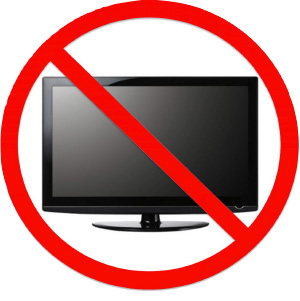
We all live in a world where media sources continue to evolve and bombard our children. It is estimated that a typical middle/upper class household has two televisions, two computers, one video game system, and an additional two wireless devices (ie. tablets, smart phones, handheld game systems like Nintendo DS). The influences that all these media sources have on our children cannot be overstated- it is strong and very significant. There have been thousands of studies documenting these effects and a long time ago it was scientifically proven that there is no debate- our children are affected by the things they see on their TV’s, video games, and computers.
These effects are primarily negative- increased aggressive behaviors, poor attention spans, and decreased physical activity. There is nothing a child gains from television that would not be more effectively learned from a social interaction with another person. There are new studies all the time proving this negative effect- just last month in “Pediatrics” an article examined how media affects the way our adolescents view and use profanity and enact aggression. It showed that there is a correlation between media and the use of profanity and aggression. So not only does the TV affect their behavior, it can affect the way they talk. You can further extrapolate that TV affects the way they communicate in every facet of their day- school, friends, parents, teachers, etc.
The question is what do you do about it as a parent? It is too difficult to tackle all the ways we should be dealing with our children’s media exposure in one newsletter so we have chosen to chip away over a series of articles. This first article will try to tackle the issue of a television in a child’s bedroom. The simple truth is that televisions have no place in a child or teenager’s bedroom. You may now be saying to yourself:
“But my child is only allowed to watch movies,” or
“I have parental controls set so they can only watch good shows,” or
“They are going to watch TV anyway so why not in their room.”
The reality is, studies have shown that no matter what control you think you have, children with televisions in their bedroom watch significantly more TV than children without televisions in their bedrooms. A bedroom should be a place where a child has the freedom to be creative or to rest but not to be sedentary and replace opportunities to play. Older children and adolescents with televisions in their bedroom have been shown to have less physical activity, poorer dietary habits, fewer family meals, poorer school performance, and more sleep difficulties. We already know that any television viewing is associated with an increase in aggressive behavior and attention problems and thus having a TV in the bedroom only amplifies these effects As a parent you have the power to eliminate or never establish a clear negative influence on your child.
To further bring home the point here are some shocking statistics about television viewing:
1,680: number of minutes the average child watches television per week
54 percent: percentage of 4-6 year-olds when asked to choose between watching TV and spending time with their fathers, preferred TV
900: hours per year the average American youth spends in school
1,500: hours per year the average American youth watches TV:
8,000: number of murders seen on TV by the time an average child finishes elementary school
200,000: number of violent acts seen on TV by age 18
There has never been a more important time to apply responsible media control for your family. We live in an era where these numbers are surely going to increase when you start to factor in video games and internet usage. So where does responsible parenting start? Let’s start by getting the TV out of the bedroom.
By Dr. Darren Saks
Dr. Darren Sacks is a pediatrician with Tenafly Pediatrics.













